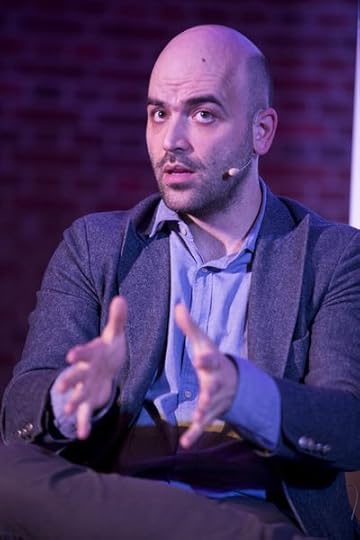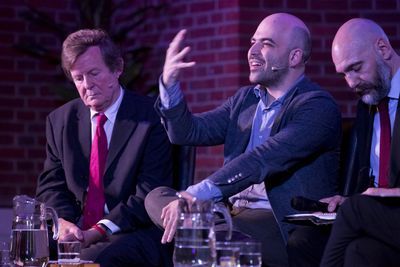���There is just one thing ��� the truth���: an interview with Roberto Saviano and David Hare

Roberto Saviano; credit: George Torode
By CATHARINE MORRIS
Ten years ago, at the age of twenty-six, the Italian writer Roberto Saviano published Gomorrah, an anatomy of the Neapolitan mafia. It was inspired by his own disturbing experiences of violence in his home city, and grew out of an extended period of undercover investigation.
In an article published in the Financial Times last year, Misha Glenny described what life has been like for Saviano since then:
���He is shadowed wherever he goes by between five and seven armed members of the Carabinieri, the elite police squadron that has been responsible for his security since 2006 . . . . To begin with, he had to sleep in a different apartment every night; his family have either been forced into witness protection or compelled to renounce him; and even abroad he needs armed protection around the clock. To this day, he cannot possibly form normal relationships as anyone close to him is transformed automatically into a proxy target for the Camorra. Unlike Salman Rushdie���s fatwa, which was negotiated away by the Iranian and British governments, the Camorra death sentence is for life.���
It was slightly surprising to me that Saviano was in a position to give his own account of things at an event hosted by English PEN in London on Thursday. Chaired by Gaby Wood and also featuring David Hare, the discussion was held in a conference room at the Emmanuel Centre in Westminster and attended by a couple of hundred people (perhaps), a fair number of them Italian. Saviano spoke (and listened) through the supremely skilful interpreter Martin Esposito; and confessed early on to certain naivity in writing Gomorrah ��� ���I didn���t decide to walk bravely into the flames . . . . I was young��� ��� while also pinpointing why the book had the effect it did. ���What scared the power I wrote about was not so much [the book as] the readers, the army of readers . . . . Even those who disagreed about the book had spoken about it."

David Hare, Roberto Saviano and Martin Esposito; credit: George Torode
Saviano and Hare were in 2011 jointly awarded the PEN Pinter Prize, which rewards writers who display, in Pinter���s own phrase, ���unflinching, unswerving, fierce intellectual determination . . . to define the real truth of our lives and our societies���. One of Wood���s lines of questioning (one also pursued at a recent London Library event, incidentally) was about whether a writer should be motivated in their work by a sense of social responsibility. Hare was with Cyril Connolly on this ��� ���If C��zanne wants to paint apples, then he���s free to paint apples��� ��� but he also observed that, in his own case, his ���temperament has coincided with curiosity about the world artistically���. (As Wood reminded us, Hare���s plays have examined the judicial system, the banking system and MI5.)
Saviano was still a child when he was overcome by the desire to write. His style was baroque ��� ���as far away as possible from reality��� ��� but when a priest was murdered by the Camorra, he found that he ���could not not look for moral reasons���. He described to us his thought process at the time: ���I���ve got to put my words into the factory, I���ve got to hone them, I���ve got to work with them. I���ve got to get them working in order to make a difference���. But the feeling of responsibility can also be debilitating, he suggested ��� it can be very similar to guilt, and has in the past ���engendered behaviours that would not really belong to me except that I���m fearful of harming others���. He was reminded of the television version of Gomorrah, for which Saviano removed ���everything that���s good in any character���, his reasoning being ���I want evil to be inescapable for [the audience]. I want them to say, ���I���m not like this, and if I���m not like this, why?������ The reaction to the series was unexpected, it seems: ���the world is telling me that in this way I���m inspiring evil, I���m making it fascinating���. There is no duty, he concluded. ���There is just one thing ��� the truth ��� and this is what we need to pursue.���
Saviano���s book ZeroZeroZero, published last year, describes London as the money-laundering capital of the world. When Saviano is in the UK or the US, he told us, he senses that people think him unduly obsessed with ideas about corruption. ���I understand that point of view . . . . It���s so hard to imagine London . . . as such a corrupt entity. By corruption I don���t mean . . . the police, the politicians, the bureaucracy; I mean financial corruption���. He referred to a rank order in which Switzerland is in position one in terms of corruption and lack of transparency, and the UK is at fifteen. That might not seem too bad, he said, ���except that there���s an asterisk��� ��� ���it only applies to the island of Great Britain, not to any offshore British territories which would immediately project Great Britain to the top���. Saviano also said that, were the UK to leave the European Union, it would be ���devoured by foreign capital���.
Hare, meanwhile, spoke of the EU referendum as something that ���in theory is meant to be about the country at large, but . . . is about a power struggle among the Conservative Party���; and told us that when he wrote about the financial crisis, he had ���never met a group of people so totally self-interested as the bankers���: ���they knew nothing about anything except themselves���. Our sense of being ���excluded from everything that is significant��� makes us feel helpless, he said ��� and one of the things he finds interesting when writing about his own times is the strength of audience response to ���oppositional��� material. His new short play Ayn Rand Takes a Stand is currently playing in the West End (as part of A View From Islington North directed by Max Stafford-Clark); and the reaction to it, he said, is ���disproportionate to its quality���.
Saviano said that we���ve all got homework to do: "to get to know things���, to debate. He suggested that we follow the activities of Transparency, and read documents published by the Secret Intelligence Services. As Hare pointed out, we can also do something much simpler. ���You come to look in your own life . . . and the lives of those near you for individual acts of goodness as being the way in which it is possible for you to express yourself���. Saviano had said something along these lines himself: ���I believe in goodness, the good gesture ��� eye to eye, hand to hand; and I hope my readers will believe in this too���.
Peter Stothard's Blog
- Peter Stothard's profile
- 30 followers



